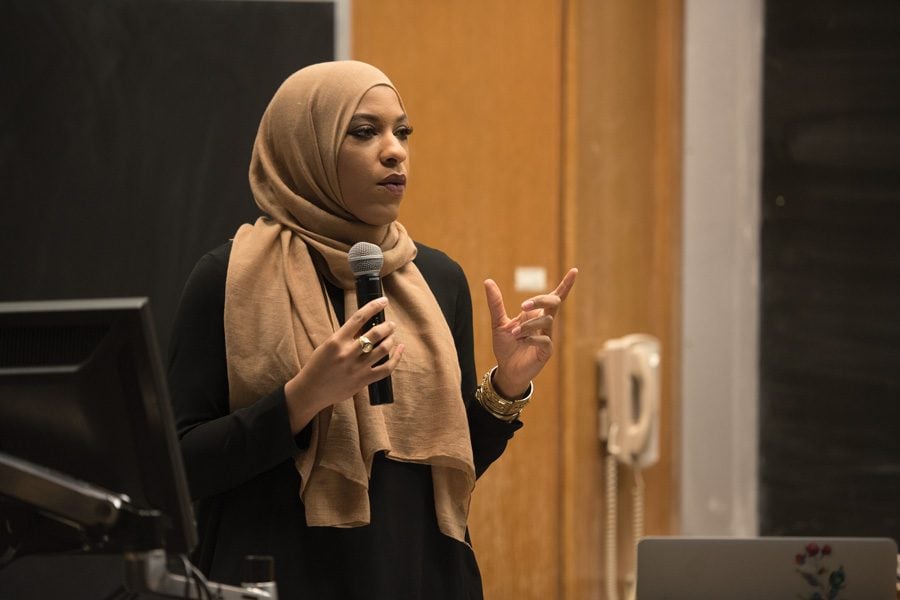Olympic fencer Ibtihaj Muhammad discusses representation, athletic career
Allie Goulding/The Daily Northwestern
Olympic fencer Ibtihaj Muhammad speaks to a crowd about her experiences as a black, Muslim-American athlete. The event, part of McSA’s “Discover Islam” week programming, was held in Technological Institute.
February 23, 2017
An aversion to losing drove Ibtihaj Muhammad during low points in her career, the Olympic fencer said during a talk Wednesday.
Muhammad, the second speaker in the Muslim-cultural Students Association’s annual “Discover Islam” week, discussed her personal journey as a black, Muslim-American athlete. As the first Muslim-American woman to win a medal at the Olympic Games, Muhammad captured bronze as part of the Women’s Sabre Team in Rio de Janeiro last summer. Muhammad is a five-time World medalist, having won gold with Team USA at the 2014 Senior World Championships.
While previous speakers at “Discover Islam” events have been comedians or other figures in popular culture, McSA co-president Rimsha Ganatra said hosting a high profile Muslim-American athlete like Muhammad helps students dismantle the notion that all Muslims have similar backgrounds.
“We’re all not just pre-meds at Northwestern,” Ganatra, a Weinberg senior, said. “Showing the diversity within the Muslim community is super important.”
Although Muhammad’s mother pushed her to do sports at an early age, she stumbled on fencing through chance after seeing a group of practicing fencers while stuck in traffic at the age of 12, she said.
Upon graduation from Duke University in 2007, Muhammad trained “relentlessly” but failed to qualify for the London 2012 Olympics. Last summer, however, she secured one of the three spots on the women’s fencing team, ranking second in the United States and seventh in the world in 2016.
Muhammad said though the United States Olympic Team is “the most diverse team in the world,” maintaining her visibility as a black Muslim woman remains one of her primary objectives as an athlete.
“I want our youth and our kids to see themselves in spaces where they’re underrepresented, to see themselves in spaces where we haven’t always been welcome,” Muhammad said.
In addition to her athletic career, Muhammad also discussed her modest fashion line, Louella. Muhammad is the first U.S. Olympic fencer to compete in a hijab. She also said she signed a book deal last week to produce an adult memoir, a child mini-series and a young adult memoir.
During a Q&A session, Muhammad said though other Muslim athletes choose not to fast for Ramadan while competing, she maintained her month-long fast despite the physical strains it put on her.
“Fasting while fencing is so hard,” she said. “But for me, I’ve always felt that my religion comes first.”
Jeremy Kaish, co-president of Northwestern men’s fencing team, attended the event and said he found Muhammad relatable despite her fame. The McCormick junior added that he found Muhammad’s determination inspiring.
“I really admire the way she talks about persistence and how she tells herself that she is a champion and that she can do basically whatever she wants to do,” Kaish said.
Email: [email protected]
Twitter: @jakeholland97












